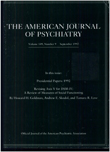Glucocorticoid level and neuropsychiatric symptoms in homosexual men with HIV infection
Abstract
OBJECTIVE: There is a controversial literature suggesting that stress, anxiety, and depression are harmful to the immune system and therefore to health. Preclinical studies indicate that activation of the hypothalamic-pituitary-adrenal (HPA) axis by stress may be responsible for immunocompromise. The goal of this study was to assess this phenomenon in human immunodeficiency virus (HIV) infection. METHOD: Homosexual men in the community who did not meet modified Centers for Disease Control criteria for acquired immune deficiency syndrome (AIDS) were recruited for the study; 113 of the men were HIV positive and 77 were HIV negative. Very few of the men studied suffered from depression or anxiety disorder at the time of the first assessment. Twenty-four- hour urinary free cortisol levels were obtained from the 112 HIV- positive and 75 HIV-negative men whose 24-hour urine volumes were 500 ml or more. Cortisol levels were correlated with measures of medical, immunological, neurological, and psychiatric status. RESULTS: Small but significant correlations between 24-hour urinary free cortisol and medical status, level of depression, and level of anxiety were found in the HIV-positive group. There was no relationship between cortisol level and the number of CD4+ or CD8+ T lymphocytes or the CD4-CD8 ratio. CONCLUSIONS: Although HPA activation may be associated with stress in cases of HIV infection, it does not seem to be associated with further loss of CD4+ T lymphocytes. Subjects with HIV infection with the most evidence of medical complications may also be the most anxious and depressed.
Access content
To read the fulltext, please use one of the options below to sign in or purchase access.- Personal login
- Institutional Login
- Sign in via OpenAthens
- Register for access
-
Please login/register if you wish to pair your device and check access availability.
Not a subscriber?
PsychiatryOnline subscription options offer access to the DSM-5 library, books, journals, CME, and patient resources. This all-in-one virtual library provides psychiatrists and mental health professionals with key resources for diagnosis, treatment, research, and professional development.
Need more help? PsychiatryOnline Customer Service may be reached by emailing [email protected] or by calling 800-368-5777 (in the U.S.) or 703-907-7322 (outside the U.S.).



